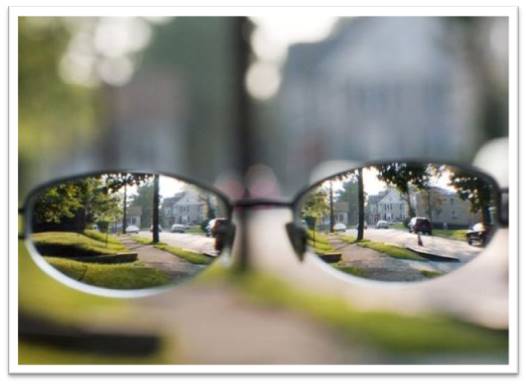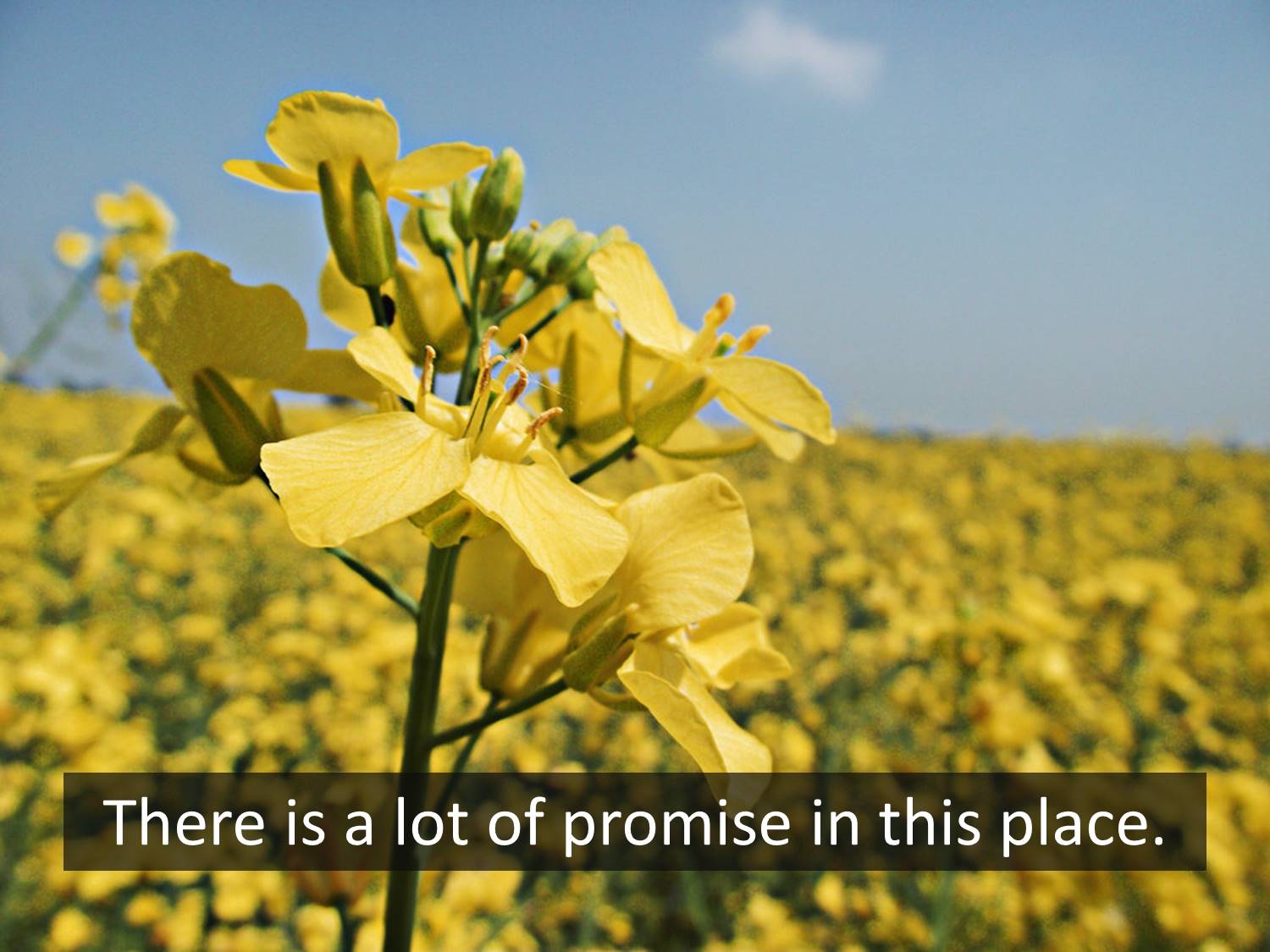Wheat, weeds, and mustard seeds

He put before them another parable: “The kingdom of heaven may be compared to someone who sowed good seed in his field; but while everybody was asleep, an enemy came and sowed weeds among the wheat, and then went away. So when the plants came up and bore grain, then the weeds appeared as well. And the slaves of the householder came and said to him, ‘Master, did you not sow good seed in your field? Where, then, did these weeds come from?’ He answered, ‘An enemy has done this.’ The slaves said to him, ‘Then do you want us to go and gather them?’ But he replied, ‘No; for in gathering the weeds you would uproot the wheat along with them. Let both of them grow together until the harvest; and at harvest time I will tell the reapers, 'Collect the weeds first and bind them in bundles to be burned, but gather the wheat into my barn.'
Sometimes our world gets overgrown with ugliness. We think it would be better if we could just burn all of the problems away and start over. That, at least, is how we used to deal with the overgrown ugliness of the hills at our family farm back in Kentucky. After the ash washed away, the black would turn to a dark green and the slopes would grow to be lush and golden, pure and clean looking. On an early spring morning, I could take off my shoes and run down the hill, raking the tall grass between my toes, harvesting a mixture of dew and seed with my feet. Near the end of the summer the hills would be overgrown again with thistles and ugly, prickly things. If we didn't take care of it, by the next year, the hillside would be overgrown with briar bushes and small thorny trees.
To get the hillside back to its original beauty, we used the oldest and most brutal of all human gardening tools--fire! It was a family affair. We would start at the bottom of the hill, pour a little gasoline in the direction we wanted the fire to go, and then light it up. Stone Hill temporary became a palace of dancing persimmon minarets. We stood around with smoke in our eyes and watched, water hoses in hand, ready to keep the fire from going wild. It was spectacular!
As a kid, after the first time we held this "burn the hill" ritual, I was hooked on fire.. One day, when I was asked to pull up some weeds around a large boulder in the yard, I decided to try out the fire trick. I found a can of lighter fluid and a lighter near the barn, and I went about getting rid of the weeds the easier way. Within seconds, my stepfather came running. He had such patience with me. Luckily, it had not spread far. I had only started a small yard fire. Once the fire was out, he bent down on his knees, rolled up his sleeves, dug his hands in the dirt to help pull up the weeds next to me, and he explained the danger of what I had done. I had been so anxious to get rid of the weeds the easy way that I had risked destroying everything else. If he had not intervened, I would probably have burned down the yard and the trees and the flowers and the house. But he wanted me to see that our work was not about getting rid of the weeds. It was about seeing the promise of beauty that comes with taking care of what you have. A few years of work and beauty sprouted up everywhere. There was a lot of promise in that place.
I have only been the pastor at Trinity UMC in Rahway, NJ for three weeks. When I look around, God speaks words of love and conviction from somewhere deep within me: "There is a lot of promise in this place."
We all face the challenge of learning to see. We live in a microwave/internet society that teaches us to look for quick and easy answers. It takes time to learn to see each other as God sees us. But our society teaches us that our first impressions are what matters. So we quickly decide what to think. No one wants to take the time to really get to know each other. Most of us have not learned the practice of listening to each other's stories. And that means that most of the time we cannot have any real conversations about the things that really matter. The late feminist theologian Nelle Morton once said that hope comes from "a great ear at the heart of the universe –at the heart of our common life," that comes alive when we learn to hear one another to speech. The real curse underneath the most important sins of our time (racism, sexism, classism, etc.) is not simply oppression, or greed, or power. It is the lies that human beings learn to tell about each other, shaping our imaginations, convincing us that we can be excused from the hard work of getting to really know each other. Society teaches us to look at our neighbors and imagine them as problem-filled rather than promise-filled.
Along with the lies that shape our imagination of each other comes our addiction to quick fixes. Rather than seeing the beauty around us, rather than seeing a world filled with promises, we focus on the problems. And we go about ridding the world of problems by calling down fire from heaven. We think we would be better off in a world without problems, so we go about burning it all up so we can start over. Looking for quick fixes to rid the world of its problems, we become just like children on a hillside playing with fire.
 But that's not just a recent human condition. Humans have been solving our imaginary problems that way all along. Our scripture begins with a story of humanity choosing to depend on fire rather than living in the beauty of the garden. The Gospel of Luke tells the story about a time when Jesus and his disciples were going through a Samaritan village. Because Jesus was on his way to Jerusalem, the people of the village would not welcome him into their town. Two of Jesus' disciples, James and John, asked Jesus: "Do you want us to call down fire from heaven to consume them?" (Luke 9:54) And of course, Jesus rebuked them.
But that's not just a recent human condition. Humans have been solving our imaginary problems that way all along. Our scripture begins with a story of humanity choosing to depend on fire rather than living in the beauty of the garden. The Gospel of Luke tells the story about a time when Jesus and his disciples were going through a Samaritan village. Because Jesus was on his way to Jerusalem, the people of the village would not welcome him into their town. Two of Jesus' disciples, James and John, asked Jesus: "Do you want us to call down fire from heaven to consume them?" (Luke 9:54) And of course, Jesus rebuked them.
The problem James and John had is one most of us have too: myopia. We don't have the eyes to see. We can't see beyond the surface of things, beyond the trouble. We've only learned to look at the problems rather than believe in the promises. But despite the mess, the gospel has taught me to believe there is goodness. Even in the midst of all that is broken, I believe there is good news. I believe what the gospel message calls us to believe: "There is a lot of promise in this place."
The story of Jesus can be told in many ways. Sometimes, the story of Jesus is told by beginning with the image of a god who is like an angry old man, controlling a world that is full of sinful people on whom this god is prepared to pour out his wrath, ready at any moment to burn the whole world up and start again. But Jesus, who is somehow supposed to be like this god, is willing to take that wrath on himself. That is the story of an angry god, a story that seems quite inconsistent with the character of Jesus. The story of an angry god is not the story of the Gospel. That is a dangerous story, and it is not the Good News of Jesus Christ.
(On that note, have you heard that song by Gungor, "God is not a white man"?)
The Gospel of Jesus Christ is an incarnational story. It is not the story of delayed destruction, it's the story of renovation and restoration. It's the story of not giving up, of getting on the knees, of rolling up the sleeves, of getting the hands dirty. The Gospel I preach is the Good News of a God with a vision, who can look beyond our problems and see that we have promise. That is because the promise God sees in us is not just our promise, it is God's promise.
When God looks at us, God sees more than a field of weeds. And so, rather than burn the whole thing up, God chose to get close, to get involved, to show love and patience. God chose to become one of us, to love us, to show us how to fully be the people of promise we are. In Jesus Christ, God shows us how to be patient and persistent. Jesus shows us how to love in the midst of hate. Even when we look at ourselves or those around us and think there is little to believe in, Jesus shows us how to believe. Jesus shows us how to have the faith of a mustard seed. Jesus teaches us to look at the world around us and see the wheat rather than just the weeds. Jesus teaches us to say, "There is a lot of promise in this place."
This parable of Jesus has a lot to say to us today. It is clear that God has gifted us with immense power. We can use it to be creative or destructive. And if we are not careful and we go pulling up the weeds of the world, we will find there is nothing left to love. In our efforts to rid the world of evil, we unwittingly go about ridding the world of all that is good.
This week has been one of the worst. The nation of Israel began a ground offensive in Gaza. A plane full of people were gunned down in Ukraine. Hungry, homeless, nationless children are suffering at the US border. There is too much ugliness. Too much hurt and despair. Too many people working to rid the world of weeds, anxious to find a quick fix. Too many willing to burn it all up in the belief that after the destruction will come peace. But in Jesus, God calls us to look past the problems and to have faith: "There is a lot of promise in this place."
Those of us who believe in Jesus believe that God has promised us a world of love and joy and peace. But this is more than a hope, it is a calling. We cannot bring about peace in the world if we are not willing to do the hard work of learning to live peacefully. If we pull up the weeds, we will kill the wheat with it. For those of us who have been called by the Kingdom of Heaven, we have been called to see beyond the brokenness, the ugliness, the violence, the despair. We are called to believe that there is goodness. And those who believe in Jesus are called to live like we believe there is goodness in the world. There is a lot of promise in this place.

